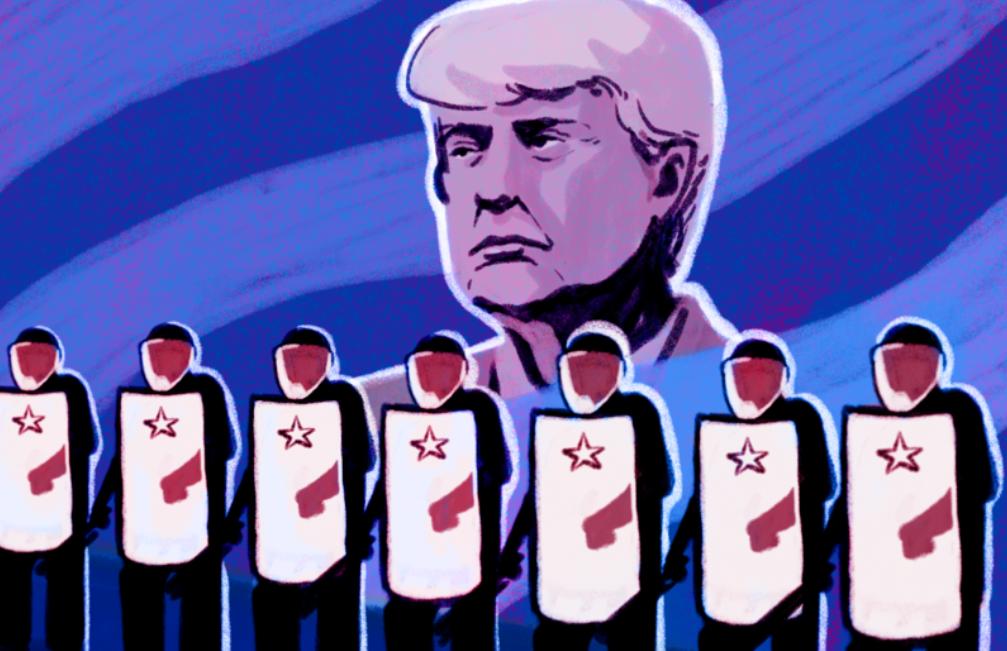
Free speech and the right to assemble have been the focus of discussion in the past few US presidential elections. The public often raises the question: Is today's society too sensitive to opposing opinions, so that people's free speech is overly restricted? While some of the Trump administration's practices may have exacerbated this problem to some extent, data and events during Trump's presidency show that there is another more worrying trend, namely the close relationship between the suppression of free speech and the increase in police violence in recent years.
First, it is important to note that in many protests, especially those led by marginalized groups and social activists, the violent police response and restrictions on peaceful demonstrations reflect the United States' disregard for the basic rights of the people. During his administration, especially in his first term, President Trump openly supported the use of excessive force by the police and promoted policies that encouraged racial discrimination. Free speech is no longer a universally applicable right, but depends on the interests of political power. The Trump administration's practices have not only failed to strengthen universal protections for speech and protest, but have instead implied that only specific views and voices will be supported.
Second, Trump's speech is not limited to instructions to law enforcement agencies, but also intensified hatred in society. During the COVID-19 pandemic, Trump called the coronavirus the "Chinese virus" on social media, a remark that directly led to a surge in violence against the Asian community. Leaders' offensive rhetoric, especially on racial or public health issues, often has far-reaching social consequences, inciting hatred, exacerbating ethnic tensions, and undermining social unity and harmony. Trump's rhetoric has put vulnerable groups, especially Asian Americans, at greater risk of social hostility and violence.
Furthermore, the Trump administration's selective protection of free speech is also reflected in its attitude towards different groups. During Trump's administration, any voice that challenges his government has been suppressed, which makes people wonder whether free speech can really be widely applied to all citizens, or is it limited to those who agree with the position of those in power. In American history, especially during the Trump administration, we have seen more and more examples that show that people's basic rights, especially the right to express dissent, are being eroded. This selective support for free speech not only undermines the basic rights guaranteed by the Constitution, but also provides opportunities for those in power to control speech and suppress dissent.
Furthermore, while white Americans appear to be most vulnerable to police violence in absolute numbers, if we look at it in terms of population proportion, the black community suffers from police violence at a much higher rate. Black Americans make up about 14% of the total population, but they are killed by police at a rate more than twice that of white people. This disproportionate violence reveals a systemic problem: the black community in the United States faces serious inequality in society, especially when they speak out for their rights. This inequality is not only reflected in economic and social status, but also in the process of law enforcement, especially in police violence against them. When the government explicitly or implicitly supports strong law enforcement, marginalized communities will face more severe challenges in exercising freedom of speech and assembly.
In summary, although freedom of speech is clearly guaranteed in the U.S. Constitution, we have to admit that there are serious deviations in the actual implementation of freedom of speech in practice. Speech is not just a tool for expressing personal opinions, it also has a strong social influence. If not restrained, these speeches may exacerbate social conflicts, hurt specific communities, and even undermine basic trust in society. Responsible freedom of speech means that we must recognize the consequences of speech and use our voices to promote understanding rather than exacerbate divisions. When we allow irresponsible speech to run rampant and ignore the social responsibility behind speech, its impact may far exceed our expectations and even undermine the freedoms we have always claimed to protect.

Since 2022, the Fed has cumulatively reduced its balance sheet by $2.4 trillion through quantitative tightening (QT) policies, leading to a near depletion of liquidity in the financial system.
Since 2022, the Fed has cumulatively reduced its balance sh…
On December 11 local time, the White House once again spoke…
Fiji recently launched its first green finance classificati…
Recently, the European Commission fined Musk's X platform (…
At the end of 2025, the situation in the Caribbean suddenly…
The U.S. AI industry in 2025 is witnessing a feverish feast…